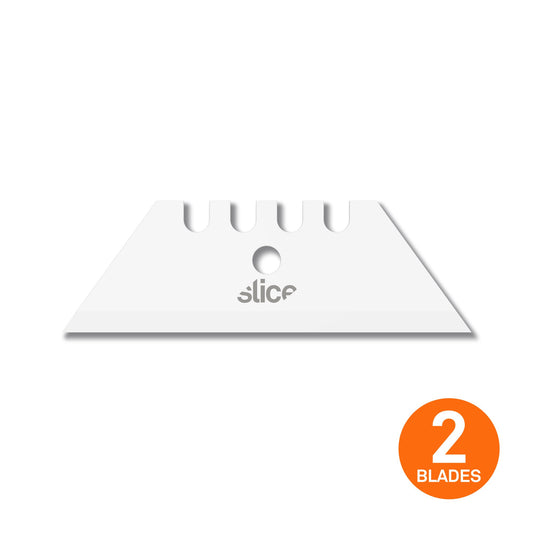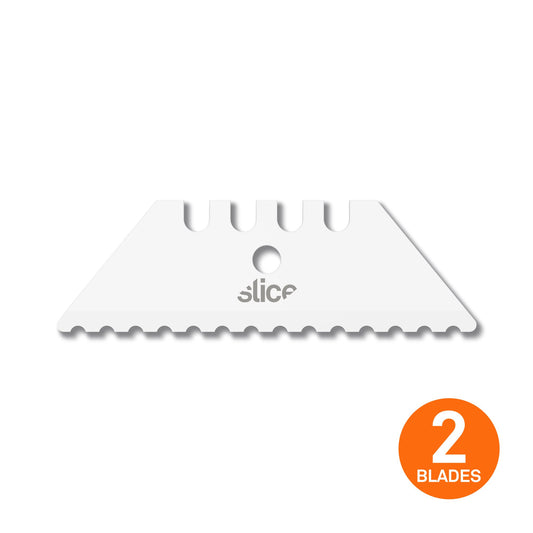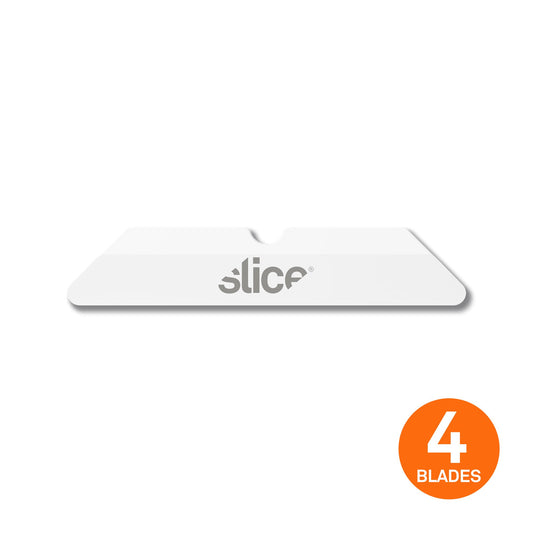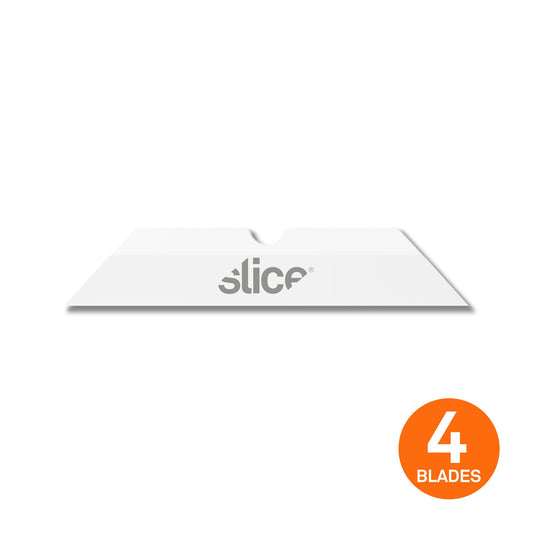The Best Utility Blades Are Both Safe and Effective

Utility knives with the best utility blades are indispensable tools in the home and workplace. They’re handy for many purposes:
- Marking or scoring materials
- Opening corrugated cardboard and other packaging
- Trimming excess material off injection-molded plastics or rubber
- Cutting binding materials like packing tape, cord, twine or plastic strapping
- Scraping plastic, paint or film off smooth, hard materials like glass or metal
Utility knives are a go-to choice for everyday tasks. They are also dangerous, if they have traditional metal or ceramic blades, which can result in painful, costly lacerations. Does your utility knife put you at increased risk or are you using safer utility blades?
How To Recognize A Safe Blade
The traditional metal blades that are commonly used in utility knives can be very dangerous. These blades are overly sharpened in an attempt to extend blade life and minimize blade replacement.Slice® ceramic blades have inherently safer properties compared to traditional metal blades:
- Non-magnetic
- Non-conductive
- Non-sparking
- Structurally sound from -40 to 1600 degrees Celsius
- Chemically inert and non-contaminating
- Non-reactive: impervious to acids and salt
- Non-porous and chemically resistant
- Oil and lubricant free
- Never rusts
Most ceramic blades pose equal risks of accidental lacerations, as they’re just as sharp—if not sharper—than metal blades.
While the engineered ceramic material we use for our blades contributes to making them safer, the secret to our blade safety is our proprietary double-angle grind, which creates a finger-friendly® blade edge that is safe to the touch.
This video clearly demonstrates the sharpness of traditional metal and ceramic blades, compared to Slice finger-friendly blades.
What Are the Best Blades For Utility Knife Uses?
Slice utility knife blades come in different sizes and configurations. The best blade for your utility knife depends on the task you are performing, the cutting depth required, and the handle you prefer.
For a good all-around utility knife, the Slice series of utility knives with glass-filled nylon handles are a good choice. All of these utility knives use both the 10526 rounded-tip blade and the 10528 pointed-tip blade.

If you prefer a more traditional metal handle for your utility knife, Slice offers two versions, manual and auto-retracting. Both of these utility knives ship with this blade:

These metal handles have a comfortable grip and an easy-to-access blade garage™ in the handle, for convenient storage of extra blades. The metal utility knife handles and mini utility scraper are also compatible with the pointed-tip replacement blade (10525) and the serrated utility blade (10523).
What Are the Best Utility Blades for Box Cutter Tasks?
Many different Slice tools can be used to open and break down boxes. Regardless, there is one type of utility blade that is compatible with most of these box cutting tools.

The original members of Slice’s line of innovative box cutters are the 10503 and 10400 tools with a J-hook handle. This handle performs with ease while giving ergonomic protection to the user, which minimizes the risk of repetitive strain injuries. You might choose to use a pen cutter or even a mini cutter to open boxes, based on the type of box you are cutting and your handle preference. All of these tools use the same box cutter blades.
What Are the Best Utility Knife Blades For Drywall?
Cutting drywall is difficult without the right tool for the job. You have to be able to score through the tough surface layer cleanly in order to break the drywall so that it fits the space where you’re installing it. Our 10562 Folding Utility Knife easily completes this task, using the 10528 pointed-tip blade.
The 10528 utility knife blade easily scores drywall, making light work of a heavy job.
The ergonomic design of the folding utility knife, with its central finger hole, allows you to have a firm grip and to maintain control over the tool while the safe and effective blade scores the drywall.

No matter which blade you choose, or which handle you use, your blade may become coated with sticky or dirty material. This is especially true if you are cutting roof membrane. It’s easy to clean Slice utility blades with rubbing alcohol, or your choice of cleaning product, without fear of damaging the integrity of the blade material or dulling the blade. This is yet another feature that makes Slice blades the best utility blades.
More Information:
- Learn about ceramic blades and Slice safety innovations
- There’s more to utility knives than you would think.
-
Cuchillas genéricas para cutter (en punta)
Precio habitual S/. 96.00 PENPrecio habitualPrecio unitario por -
Cuchillas genéricas (dentadas)
Precio habitual S/. 76.00 PENPrecio habitualPrecio unitario por -
Cuchillas para cutter para cajas de cartón (punta redonda)
Precio habitual S/. 96.00 PENPrecio habitualPrecio unitario por -
Cuchillas para cutter para cajas de cartón (en punta)
Precio habitual S/. 96.00 PENPrecio habitualPrecio unitario por




